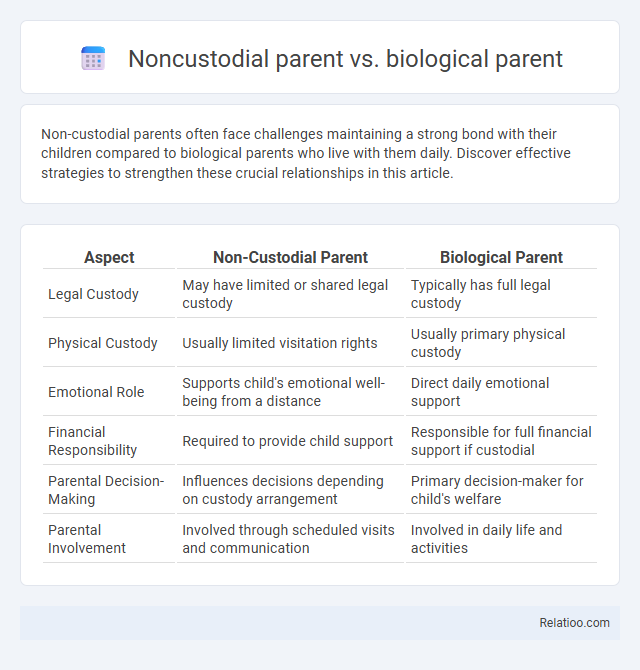Non-custodial parents often face challenges maintaining a strong bond with their children compared to biological parents who live with them daily. Discover effective strategies to strengthen these crucial relationships in this article.
Table of Comparison
| Aspect | Non-Custodial Parent | Biological Parent |
|---|---|---|
| Legal Custody | May have limited or shared legal custody | Typically has full legal custody |
| Physical Custody | Usually limited visitation rights | Usually primary physical custody |
| Emotional Role | Supports child's emotional well-being from a distance | Direct daily emotional support |
| Financial Responsibility | Required to provide child support | Responsible for full financial support if custodial |
| Parental Decision-Making | Influences decisions depending on custody arrangement | Primary decision-maker for child's welfare |
| Parental Involvement | Involved through scheduled visits and communication | Involved in daily life and activities |
Understanding Non-Custodial and Biological Parental Roles
Non-custodial parents typically have legal rights and responsibilities but do not live with their child full-time, often contributing through visitation and financial support. Biological parents hold genetic ties and may or may not have custodial responsibilities depending on custody arrangements, influencing their involvement in the child's daily life. Understanding the distinctions between non-custodial and biological parental roles is essential for addressing legal, emotional, and financial aspects in family dynamics and child welfare decisions.
Legal Definitions: Non-Custodial Parent vs. Biological Parent
A non-custodial parent is legally defined as the parent who does not have primary physical custody of the child but retains certain parental rights, such as visitation and decision-making input. A biological parent is identified through genetic connection to the child, regardless of custody or legal responsibilities. Legal custody and parental rights are distinct, meaning a biological parent may or may not be the custodial or non-custodial parent depending on court orders and custody agreements.
Custody Arrangements and Parental Rights
Custody arrangements define the legal and physical responsibilities each parent holds, with the biological parent often having inherent rights but not always exclusive custody. Non-custodial parents retain significant parental rights, including visitation and decision-making participation, even if they do not live with the child full-time. Understanding your specific custody order clarifies your parental rights and responsibilities in maintaining a meaningful relationship with your child.
Emotional Impact on Children
Children with a non-custodial parent often face emotional challenges such as feelings of abandonment, confusion, and divided loyalty, impacting their overall psychological well-being. Biological parents who are custodial tend to influence children's sense of stability and security more deeply due to primary caregiving roles, yet non-custodial parents contribute significantly to emotional development through consistent engagement and support. Research indicates that strong, positive relationships with both custodial and non-custodial biological parents foster resilience and emotional health, mitigating potential negative effects associated with separation or divorce.
Co-Parenting Challenges and Solutions
Co-parenting challenges often arise between non-custodial parents and biological parents due to differing communication styles, parenting approaches, and schedules. Effective co-parenting solutions include establishing clear, consistent communication channels, creating detailed parenting plans, and utilizing mediation services to resolve conflicts. Prioritizing the child's well-being through mutual respect and flexibility helps both non-custodial and biological parents navigate shared responsibilities successfully.
Child Support Obligations and Responsibilities
Non-custodial parents are legally obligated to provide child support payments to the custodial parent, ensuring financial contributions toward the child's upbringing, regardless of biological ties. Biological parents, whether custodial or non-custodial, typically bear primary legal responsibility for child support, as courts prioritize the child's welfare and financial needs over parental status. Child support obligations include regular monetary payments for necessities such as education, healthcare, and housing, with enforcement mechanisms in place to ensure compliance from the non-custodial parent.
Visitation Rights for Non-Custodial Parents
Visitation rights for non-custodial parents are legally protected to ensure regular contact with their children despite not having primary custody, promoting the child's emotional well-being. Courts typically establish detailed visitation schedules, including weekends, holidays, and vacations, balancing the child's best interests with the parent's availability. Biological parents who are non-custodial retain these rights unless restricted by court orders due to concerns such as safety or neglect.
Establishing Paternity and Legal Recognition
Establishing paternity legally confirms the biological father's identity and grants him parental rights, impacting both custodial and non-custodial arrangements. In non-custodial parent cases, proving paternity is essential to gain visitation rights and obligations such as child support. Your legal recognition as a biological parent strengthens your ability to participate in decisions about your child's welfare and upbringing.
Navigating Parental Responsibilities After Divorce
Navigating parental responsibilities after divorce involves understanding the distinct roles of non-custodial and biological parents, where the non-custodial parent typically has visitation rights and shared decision-making but limited day-to-day custody. Biological parents retain inherent legal rights to their child, but custody arrangements can vary significantly based on court orders and agreements. Effective communication and legal clarity are crucial to balancing parental responsibilities, ensuring the child's well-being and maintaining consistent involvement from both non-custodial and biological parents.
Building Healthy Parent-Child Relationships
Building healthy parent-child relationships involves recognizing the unique roles of non-custodial parents, biological parents, and custodial parents in a child's life. Your consistent communication, emotional support, and active involvement contribute significantly to the child's emotional well-being and development. Prioritizing cooperation and respect among all parties fosters a stable environment, promoting trust and security for the child.

Infographic: Non-custodial parent vs Biological parent
 relatioo.com
relatioo.com